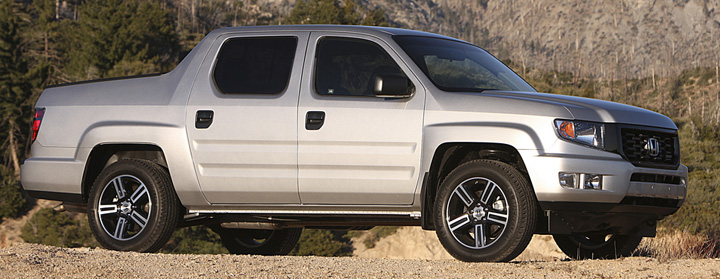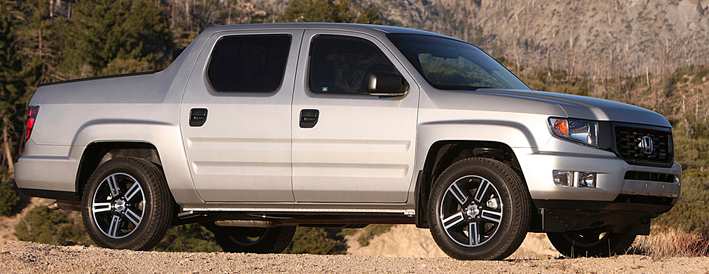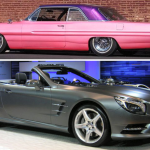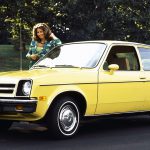
This is the second in a series of articles about cars, trucks, vans, and SUVs that we think more people should consider purchasing.
Honda Ridgeline sales in calendar 2011: 9,759
Rival sales during the same time period:
Toyota Tacoma: 110,705
Ford Ranger: 70,832
Nissan Frontier: 51,700
Chevrolet Colorado: 31,026
Two of my favorite pastimes are cars and video games. You’ll often see products from both industries receive kudos from critics but raspberries from those who hold the purse strings. The Honda Ridgeline could very well be the poster child for this phenomenon in the automotive space.
Honda Ridgeline, One of the Cars that Should Sell Better
Ridgeline launched for the 2006 model year, touting many features never before seen on a pickup. It came only as a 4-door crew cab with a short, 5-foot bed. It eschewed traditional body-on-frame construction, instead adopting a car-like unibody design. Instead of a metal cargo box, Ridgeline used dent-resistant plastic housed around a steel-reinforced floor. The clever design allowed for the creation of a covered 8.5-cubic-foot storage bin under the bed. In another first, Ridgeline’s “Dual Mode” tailgate could drop down like a traditional truck or swing to the side like that of some compact SUVs (e.g. the Toyota RAV4). An independent rear suspension promised a car-like ride and handling, while beefed-up internal components allowed Ridgeline to boast respectable towing and payload capacities of 5,000 and 1,550 pounds, respectively.
Cars That Should Sell Better, Part 3: Dodge Journey
The truck got its motivation courtesy of Honda’s proven 3.5-liter V6 engine/5-speed automatic transmission combination. While most pickups offered a choice of rear-wheel drive or 4-wheel drive, Ridgeline only came with all-wheel drive. A button on the dashboard could lock in a 50/50 front/rear split, though Honda warned that this setup should only be used to get the truck out of a tight spot and not be left engaged at all times. Also unlike most pickups, Ridgeline’s AWD system did not include a low-range gear for off-road use.
Critics loved it. We said, “Ridgeline blends pickup utility with carlike civility in a solid, sensible, Honda-style package. The light-duty design won’t suit hardcore truckers but should meet the needs of families and recreational users, as Honda intends.” The editors of Motor Trend magazine unanimously named it the 2006 Truck of the Year. It also went on to win numerous quality awards from the likes of J.D. Power and Associates.
The masses cared not. A number of factors hampered Ridgeline’s potential at sales success. Its single body style and drivetrain, short bed length, slim lineup of three or four trim levels (depending on model year), and no factory options (per Honda tradition) severely restricted the customizability that many light-duty truck buyers crave. Adding desirable features such as leather upholstery and heated front seats would force buyers into purchasing the most expensive model, which carried a stiff-for-the-class price.
Estimated and real-world fuel economy weren’t great. The EPA rated Ridgeline at 15 mpg city/21 mpg highway, the same as many large pickup trucks with much more powerful V8 engines. In our testing, we averaged just 16.2–18.3 mpg, which was also in line with bigger, more capable rigs.
Finally, Ridgeline just doesn’t look that good. Styling matters, and this Honda’s homely visage was (and still is) a turnoff, despite some tweaking over the years.
Save for the discontinued Dodge Dakota and Ford Explorer Sport Trac, every automaker in the segment saw sales of their small-truck nameplates increase in calendar 2011 . . . except Honda. Ridgeline sales dropped by nearly 40 percent that year.
Indeed, rumors began to surface that Honda was going to kill Ridgeline. Former Honda PR manager and current product planner Sage Marie set the record straight in October, saying, “And, while it is too early to talk publicly about the details of our future plans for Ridgeline, I can reassure that it will continue to build onto its fundamental strengths, and will remain an important part of the Honda product portfolio.”
Good for them. Even six years after its release, Ridgeline offers many features that other compact-truck makers can’t or won’t duplicate. We think it has enough capability to satisfy most recreational buyers while being comfortable enough to be a practical daily driver. The price tag might be a bit steep, but those very same slow sales should mean significant discounts. The cherry on top is Honda’s reputation for reliability and strong resale value.



